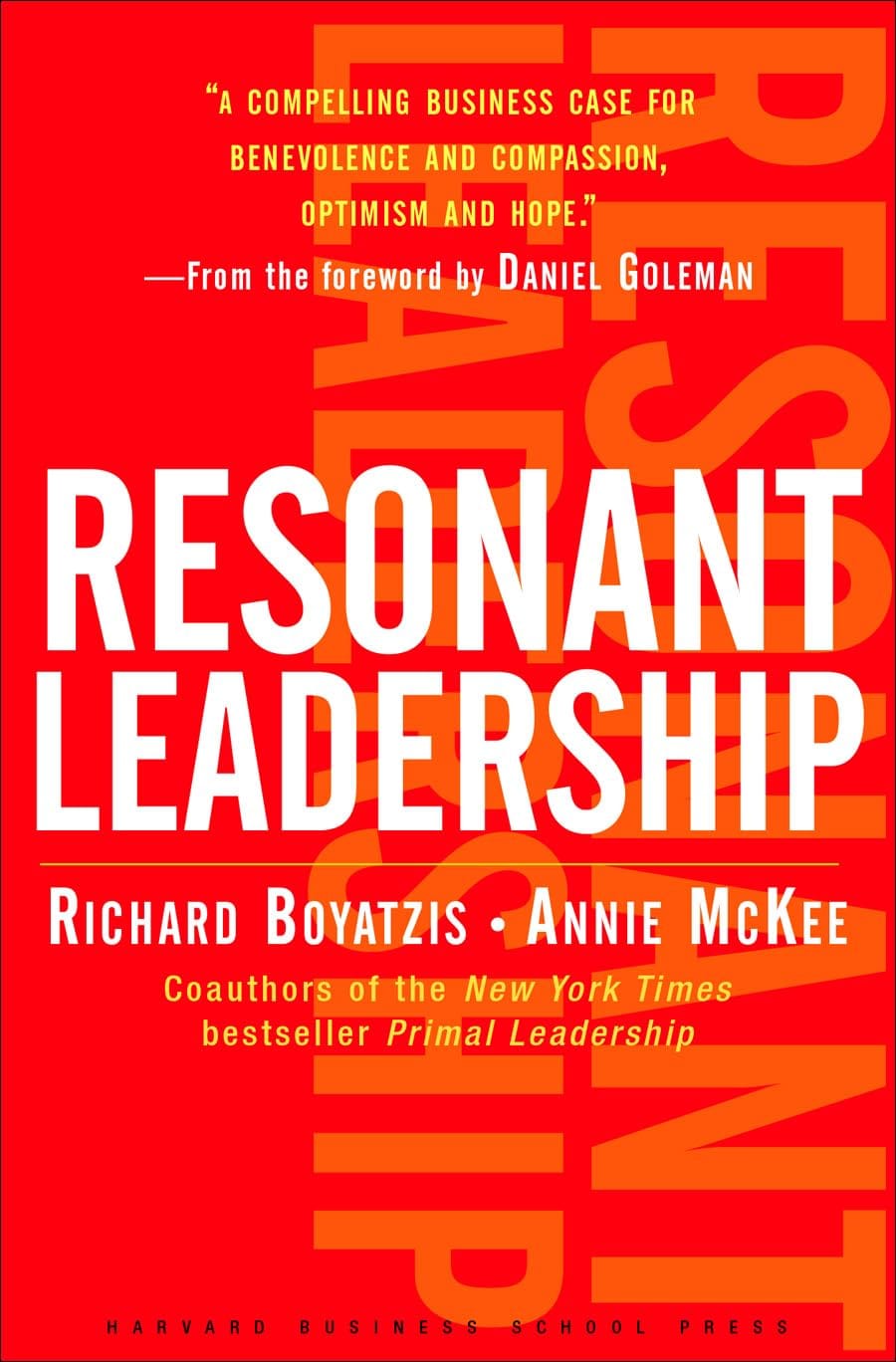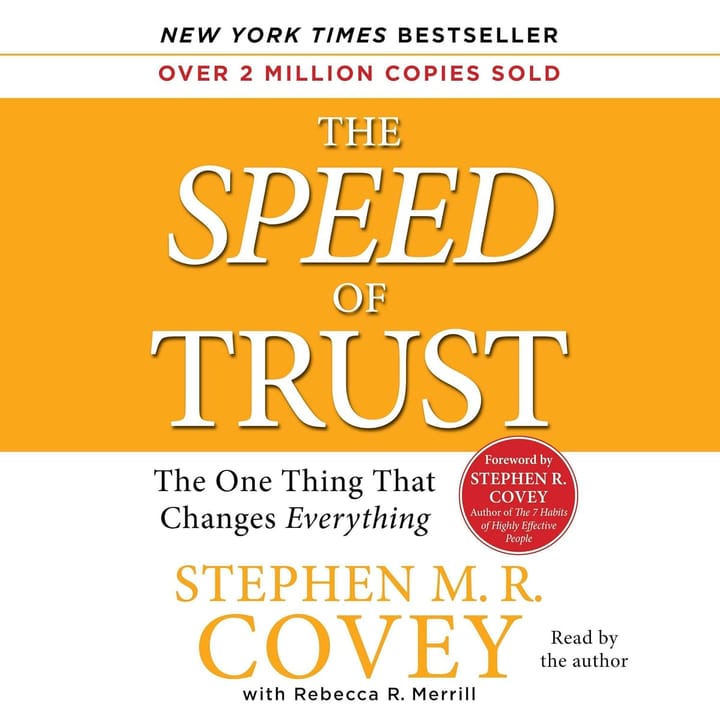Book Summary: Resonant Leadership
Discover the key principles of Resonant Leadership by Boyatzis and McKee in this comprehensive book summary article. Unlock your potential as a leader!

Essential Insights
- Resonant Leadership emphasizes the importance of emotional intelligence in effective leadership.
- The book explores the concept of resonant relationships and how they can positively impact organizational culture.
- Boyatzis and McKee provide practical tools and strategies for developing resonant leadership skills.
Introduction to Resonant Leadership
Resonant Leadership, authored by Richard Boyatzis and Annie McKee, is a seminal work that delves into the essence of effective leadership through the lens of emotional intelligence and resonant relationships. Boyatzis and McKee, renowned experts in the field of leadership development, present a compelling argument for the transformative power of resonant leadership in fostering employee engagement, organizational success, and personal well-being. By exploring how strong emotional connections can drive motivation, creativity, and collaboration, the book provides a research-based foundation for cultivating resonant leadership qualities in individuals and organizations alike.
For aspiring leaders and seasoned professionals alike, Resonant Leadership offers actionable insights and practical strategies to enhance leadership effectiveness. By emphasizing the importance of emotional intelligence, empathy, and self-awareness, Boyatzis and McKee invite readers to reflect on their own leadership styles and interpersonal relationships. Through inspiring real-life examples and practical exercises, the book not only educates but also empowers individuals to cultivate a more resonant leadership approach that resonates with their teams and drives sustainable performance. Whether you are a new leader seeking guidance or a seasoned executive looking to refine your skills, Resonant Leadership serves as a valuable resource for those committed to personal growth and organizational success.
Summary of Resonant Leadership
Resonant Leadership by Richard Boyatzis and Annie McKee emphasizes the importance of emotional intelligence in effective leadership. The authors argue that leaders who foster meaningful connections with their teams are more likely to inspire loyalty and commitment. By promoting an atmosphere of trust and empathy, leaders can enhance their effectiveness and that of their organizations. The book outlines how resonant leaders manage their own emotional states and understand the emotions of others, leading to better collaboration and performance. One of the unique contributions of this book is its focus on the relationship between leaders and followers, shifting the traditional top-down approach to a more relational model.
Boyatzis and McKee introduce the concept of "resonance," which refers to a deep connection that energizes both leaders and their teams. They also present strategies for leaders to cultivate this resonance, including self-awareness, empathy, and the ability to inspire a shared vision. Additionally, the authors provide a blend of research findings and practical examples, making their arguments both credible and accessible for aspiring leaders. Notable concepts discussed include the importance of renewal, which emphasizes the need for leaders to maintain their own well-being to effectively support others. The authors also highlight the notion of leadership as a continuous journey rather than a fixed destination, suggesting that personal growth and development should always be pursued. Ultimately, Resonant Leadership provides valuable insights for those eager to enhance their leadership skills while building meaningful relationships, encouraging readers to embrace a more empathetic and connected approach to leading.
Key Lessons From Resonant Leadership
Emotional Intelligence in Leadership
The book highlights the importance of emotional intelligence as a cornerstone of effective leadership. Leaders who can recognize their own emotions and those of others create a more connected and trusting work environment. Boyatzis and McKee stress that emotional intelligence is not just an innate skill; it can be developed through practice and reflection. This understanding opens up avenues for leaders to become more self-aware and attuned to the feelings of their teams.
An example from the book showcases a manager who actively seeks feedback from team members regarding how his emotional responses affect the workplace atmosphere. By addressing his emotions, he fosters a space where others feel safe to express their own feelings and opinions. This practice not only improves communication but also motivates the team towards shared goals and collaborative problem-solving.
This lesson is crucial because it illustrates that emotional awareness can lead to stronger relationships and increased productivity. For readers, embracing emotional intelligence can inspire more meaningful interactions not only in professional settings but also in personal lives. By focusing on emotional growth, individuals can work towards a leadership style that promotes engagement and accountability.
The Power of Resonance
Resonance refers to the ability of leaders to connect emotionally with their teams, creating a positive feedback loop that enhances motivation and commitment. Boyatzis and McKee argue that resonance is essential for effective leadership because it establishes trust and fosters a supportive environment. A leader who resonates with their team can drive collective enthusiasm for shared visions and objectives.
In one notable illustration, the authors describe a leader who, through active listening and validation of employee contributions, cultivates a resonant atmosphere. This leader frequently checks in on employee well-being, reinforcing that individual voices matter in the organization. As a result, the team feels more invested and driven toward achieving common goals.
This lesson underscores the importance of authentic connections in leadership. For readers, understanding the impact of resonance can lead to a shift in how they engage with colleagues and subordinates. By fostering resonance, individuals can inspire and mobilize their teams, leading to greater collective achievement and a healthier work culture.
Coaching and Development
Another vital lesson from the book is the role of coaching in leadership development. Boyatzis and McKee emphasize that effective leaders are not merely managers; they also serve as coaches who empower team members to grow and realize their potential. By investing time in the development of others, leaders enhance their own influence and foster a collaborative atmosphere.
The authors provide an example of a leader who implements regular one-on-one coaching sessions focusing on individual strengths and growth areas. This approach not only builds trust but also equips team members with the tools necessary for their professional advancement. The leader’s commitment to coaching results in increased employee satisfaction and lower turnover rates.
Mindfulness and Presence
Mindfulness is another key element addressed in Resonant Leadership. The authors argue that leaders who practice mindfulness are better equipped to handle stress, make thoughtful decisions, and foster a culture of well-being within their organizations. By being fully present, leaders can listen more effectively, respond with empathy, and connect with the needs of their teams.
The book recounts a scenario in which a leader incorporates mindfulness techniques, such as short meditation sessions before meetings, to enhance focus and collective energy. This practice not only improves the leader’s ability to remain engaged but also sets a standard for team members, encouraging them to adopt their own mindful habits.
This lesson is significant as it promotes mental clarity and emotional regulation. For readers, adopting mindfulness can prove to be a game-changer, helping them manage stress and improve interpersonal interactions. As mindfulness becomes integrated into everyday leadership practices, it can lead to a more compassionate and resilient work environment.
The Importance of Values and Vision
Lastly, the authors emphasize the need for leaders to articulate and embody their values and vision. Boyatzis and McKee contend that a clear vision, rooted in personal values, drives motivation and direction for both leaders and their teams. Leaders who effectively share their vision inspire team members to align their efforts toward shared objectives.
For instance, the book describes a leader who openly communicates their commitment to sustainability, thereby encouraging employees to adopt environmentally friendly practices in their work processes. This alignment enhances motivation and creates a sense of shared purpose within the team, resulting in both individual and organizational achievements.
This lesson serves as a reminder that grounding leadership in values can significantly enhance focus and collaboration. Readers can draw inspiration from this to clarify their own values and articulate a vision that aligns with their team’s goals. By doing so, they can not only enhance their leadership effectiveness but also cultivate a strong sense of community and shared purpose among team members.
Application Ideas for Resonant Leadership
Understanding Your Emotional Intelligence
One of the first steps to embodying resonant leadership is to enhance your emotional intelligence (EQ). This involves recognizing and understanding your emotions as well as the emotions of those around you. By improving EQ, leaders can build stronger relationships, create a positive work environment, and effectively motivate their teams. To implement this in your daily life, set aside time for self-reflection. Consider keeping a journal where you note emotional responses to daily events or interactions. Over time, this practice can unveil patterns in your emotions and behaviors.
In addition to self-reflection, seek feedback from peers and team members about your emotional responses and leadership style. Yes, it can be challenging to hear constructive criticism, but this feedback can be incredibly valuable for growth. To make this process engaging, consider initiating regular feedback sessions, where team members share observations in an open and trusting atmosphere. Encourage everyone to provide insights, ensuring that the focus is on constructive support rather than judgment.
A concrete example of how this works can be found in the case of a team leader who learned to identify when frustrations arose during meetings. By recognizing when team members were disengaged or anxious, the leader actively guided discussions to more productive ends, drastically improving team morale and output. By continuing to practice this awareness, the leader fostered a supportive culture that highlighted learning and resilience.
Cultivating Resonant Relationships
To create a resonant environment, leaders must prioritize relationship-building with their colleagues and teams. Start by investing time in creating authentic connections. This does not mean merely being friendly; it entails listening actively and showing genuine interest in the personal and professional lives of team members. Dedicate a few minutes each week to check in with individual team members, asking about their ongoing projects, challenges, and aspirations.
Another effective approach is to facilitate opportunities for team bonding. Organizing casual coffee chats or team-building activities can foster camaraderie and trust among team members. These informal settings encourage open dialogue and create a space where people feel comfortable sharing their thoughts and ideas. To make this initiative more impactful, consider rotating the settings and structures of these interactions; for instance, try hosting a walking meeting or cooking team lunch to encourage creativity and engagement.
A resonant example is found in a project manager who implemented weekly casual meet-ups with team members. Over time, the team began to openly share their ideas, and collaboration flourished. The manager noted that these connections led to innovative solutions and a significant boost in morale. By prioritizing relationship-building, the leader created a culture where ideas thrived, and individuals felt valued within their roles.
Practicing Mindfulness and Self-Care
Leaders can significantly impact their teams when they prioritize their own well-being. Practicing mindfulness helps leaders maintain emotional balance and focus, which ultimately benefits those around them. Start by setting aside a few minutes each day for mindfulness exercises—this could be meditation, deep breathing, or simple moments of awareness. Regular practice can reduce stress and make you better equipped to handle challenges.
To enhance this practice, consider incorporating mindfulness into team meetings. Begin gatherings with a brief check-in or breathing exercise. This can help ground the team and establish a calm and focused atmosphere, enabling everyone to contribute more effectively. Encourage everyone to participate, as it can shift the team's energy and set a positive tone for discussions. Additionally, fostering an environment that values self-care can positively impact overall productivity.
Embracing Continuous Learning
Resonant leaders view learning as an ongoing journey. To encourage this mindset, create a culture of continuous improvement within your team or organization. Start by setting personal development goals and share those goals with your team. This sets a standard that emphasizes growth and encourages others to pursue their individual development paths.
Encourage team members to explore new skills and training opportunities that align with their interests and professional growth. Consider implementing mentorship programs, where team members can learn from each other's experiences and knowledge. To facilitate this, establish clear goals for the program and encourage open communication about expectations. Consider using specific projects as learning opportunities, where team members can apply what they have learned in real-world scenarios.
An example of this can be seen in a tech company where management encouraged team members to participate in external workshops and conferences. As a result, employees returned with fresh knowledge, which contributed to innovative projects. The commitment to continuous learning not only advanced employees' careers but also propelled the organization forward, showcasing the benefits of fostering a growth mindset.
Concluding Thoughts
The book Resonant Leadership by Richard Boyatzis and Annie McKee emphasizes the crucial role of emotional intelligence in effective leadership. Throughout the article, we explored how leaders who focus on building meaningful connections with their teams inspire loyalty and commitment. By fostering an environment characterized by trust and empathy, leaders not only enhance their effectiveness but also elevate their organizations. The authors provide practical strategies for managing emotional states and understanding the emotions of others, which ultimately lead to better collaboration and improved performance. A notable aspect of the book is its shift from a traditional top-down leadership model to a more relational approach.
The concept of "resonance" is introduced, highlighting the deep connections that energize both leaders and their teams. As discussed, leaders who cultivate self-awareness, empathy, and a shared vision can significantly enhance their relationships with team members. The blending of research findings with practical examples makes the content relatable and actionable, offering a credible resource for those looking to develop their leadership skills. The article also elaborated on several key lessons, including the importance of continuous personal renewal, highlighting that effective leaders must prioritize their well-being to best support their teams.
Leadership is presented as a continuous journey of growth, compelling readers to embrace their own development as they strive to cultivate empathetic, connected relationships. The exploration of emotional intelligence, resonance, coaching, mindfulness, and the articulation of values and vision all underscore the book's emphasis on self-improvement and mutual support in leadership roles. Readers are encouraged to take inspired action by applying the principles and strategies discussed throughout the article. Whether establishing authentic connections, practicing mindfulness, or committing to continuous learning, each reader has the opportunity to enhance their personal leadership journey. Resonant Leadership serves as a valuable guide for anyone eager to foster a supportive and collaborative environment within their teams. Embrace these lessons and take steps today to cultivate a leadership style that not only drives results but also nurtures strong, meaningful relationships in both professional and personal contexts.
Related Topics
- Emotional Intelligence - The ability to understand, manage, and express emotions in oneself and others.
- Leadership Development - The process of enhancing leadership abilities and skills through various learning and training opportunities.
- Employee Engagement - The level of emotional commitment and dedication employees have towards their work and organization.
- Change Management - The systematic approach to dealing with transitions or transformations within an organization to achieve desired outcomes.
Reflection & Discussion Questions
Reflection is a powerful tool for personal growth and leadership development. Whether you're exploring your own experiences or engaging in thoughtful group discussion or team training, reflection questions help uncover new insights, clarify values, and inspire meaningful action. Below are questions designed to deepen your understanding of the concepts taught in Resonant Leadership, and facilitate constructive conversations with your team or group.
- How can you enhance your emotional intelligence to create a more connected and trusting work environment?
- What strategies can you employ to cultivate resonance and energy within your team as a leader?
- How can you incorporate coaching into your leadership style to empower team members and foster a collaborative atmosphere?
- What mindfulness techniques can you implement to handle stress and foster a culture of well-being within your organization?
- How can you articulate and embody your values and vision as a leader to drive motivation and direction for your team?
- Why is it important to prioritize relationship-building with your colleagues and team members as a leader?
- How can you prioritize self-care and mindfulness to maintain emotional balance and focus in your leadership role?
- What steps can you take to create a culture of continuous improvement within your team or organization?
- How can you apply the concept of resonance to drive collective enthusiasm and commitment towards shared objectives within your team?
- What role does renewal play in maintaining your own well-being as a leader and effectively supporting others?
- What practices can you adopt to promote mental clarity and emotional regulation in your leadership role?
- How can you shift from a top-down leadership approach to a more relational model that emphasizes connection and trust?
- How can you blend research findings with practical examples to make your leadership arguments more credible and accessible?
- What steps can you take to engage in continuous learning and personal development within your team or organization?
- How can you inspire loyalty and commitment within your team by fostering meaningful connections and empathy as a leader?
Recommended Reading
Below are a few recommended books related to concepts taught in Resonant Leadership.
- Primal Leadership: Realizing the Power of Emotional Intelligence by Daniel Goleman, Richard Boyatzis, and Annie McKee. This book explores the role of emotional intelligence in effective leadership.
- The Leadership Challenge: How to Make Extraordinary Things Happen in Organizations by James M. Kouzes and Barry Z. Posner. This book provides practical advice for becoming a better leader and inspiring others to achieve their best.
- Emotional Intelligence: Why It Can Matter More Than IQ by Daniel Goleman. This book delves into the importance of emotional intelligence in personal and professional success.
Frequently Asked Questions
What is the main premise of Resonant Leadership?
Resonant Leadership explores the key components of effective leadership, emphasizing the importance of emotional intelligence and creating positive emotional connections with others. The book argues that leaders who are able to resonate with their followers can inspire peak performance, foster a sense of trust and loyalty, and cultivate a thriving organizational culture. By focusing on empathy, self-awareness, and mindfulness, leaders can develop a resonance that leads to greater success and fulfillment in their roles.
Does resonant leadership mean always being positive and avoiding negative emotions?
Resonant leadership does not mean avoiding negative emotions or always being positive. In fact, part of being a resonant leader is acknowledging negative emotions and addressing them in a constructive way. Resonant leaders are able to empathize with others, understand their emotions, and work through challenges together, creating a more positive and productive work environment.
How can leaders work on improving their emotional intelligence?
Leaders can work on improving their emotional intelligence by engaging in practices such as self-reflection, self-awareness, empathy, and social skills. This involves becoming more aware of their own emotions and the emotions of others, as well as practicing active listening, effective communication, and building strong relationships. By focusing on developing these key skills, leaders can enhance their emotional intelligence and ultimately become more resonant leaders.
How can I develop my emotional intelligence as a leader?
Developing emotional intelligence as a leader involves self-awareness, self-management, social awareness, and relationship management. This can be achieved through activities such as self-reflection, receiving feedback from others, practicing mindfulness, and actively listening to others. By enhancing your emotional intelligence, you can better understand and manage your emotions, leading to more effective leadership and stronger relationships.
Buy "Resonant Leadership" on Amazon
Affiliate Disclaimer
Some of the links on this website may be affiliate links. This means that, at no additional cost to you, we may earn a commission if you click through and make a purchase. Your support through these affiliate links helps sustain and improve the quality of the content we provide.



